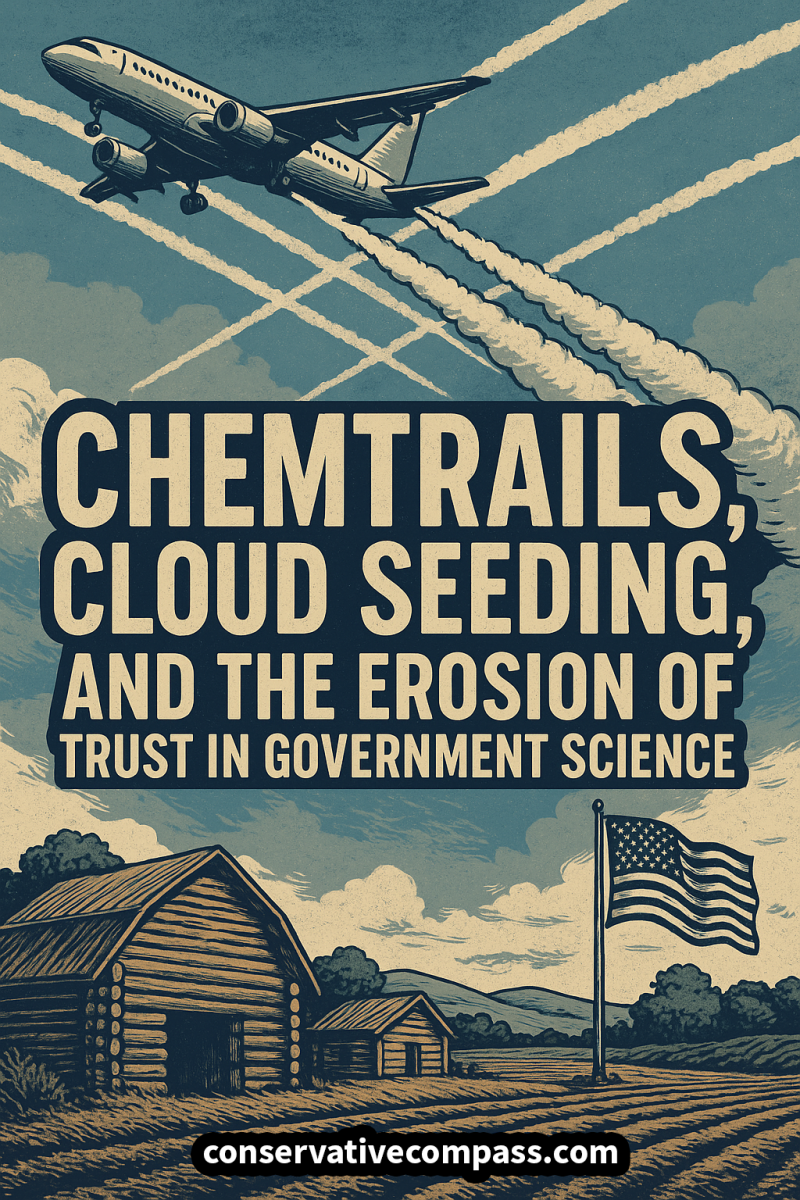By David N. Harding, Staff Writer

— Thomas Jefferson
For decades, Americans have looked up at the crisscrossed sky and asked: Are those harmless condensation trails—or are we being lied to? While mainstream agencies insist they're nothing more than ice crystals formed by jet engines, millions remain unconvinced. In an age of politicized science and government overreach, the burden of proof doesn’t lie with the skeptics—it lies with those in power.
The Reality of Weather Modification
Contrary to the dismissive tone often used by the media, weather modification is not hypothetical—it is both historically documented and actively ongoing.
Cloud seeding—the act of injecting clouds with substances like silver iodide to stimulate rain—has been used for decades and is actively practiced in states like Texas, California, and North Dakota. In fact, Texas’ own Weather Modification Board reports rainfall increases of 5–15% in seeded areas (Texas Weather Modification Association).
In China, the government announced in 2020 it was expanding its weather-control program to cover an area larger than 5.5 million square kilometers—over 1.5 times the size of India (The Guardian).
And let’s not forget Operation Popeye—a classified military effort during the Vietnam War in which the U.S. used weather manipulation to prolong the monsoon season and hinder enemy supply lines. This operation was real and only exposed years later through investigative journalism (Operation Popeye – Wikipedia).
If governments were modifying weather covertly in the 1960s, is it such a stretch to wonder what they might be doing now—with more advanced technology and less transparency?
Kristen Meghan: The Whistleblower the Media Wants You to Ignore
One of the most credible voices sounding the alarm is Kristen Meghan, a former U.S. Air Force bioenvironmental engineer. During her service, she was responsible for handling chemical inventories and ensuring environmental compliance on Air Force bases. What she found was deeply troubling.
Meghan noticed large-scale orders of aluminum, barium, and strontium compounds—materials she could not link to any documented occupational or industrial use on the base.
When she inquired about these chemicals, she claims her access to internal records was revoked, and she was warned not to pursue further questions. Eventually, she says she was threatened with psychiatric evaluation—a tactic other whistleblowers have reported in government agencies (Kristen Meghan on InfoWars).
Now a vocal critic of atmospheric experimentation, Meghan has given public testimony at various independent conferences (Consciousness Beyond Chemtrails), where she details how environmental specialists like herself are often kept in the dark about certain classified operations.
Her claims are not “debunked”—they are ignored. And in today's environment, silence is as suspicious as denial.
Can We Trust Institutions That Have Politicized the Truth?
Americans have every right to question the government narrative. Time and again, federal institutions have shown a willingness to trade truth for political convenience.
The CDC and FAA reversed policies on masks, vaccines, and safety protocols based more on politics than peer-reviewed science.
The EPA has issued diametrically opposed environmental rulings depending on which party holds the presidency.
Even NASA’s climate division has faced criticism for promoting apocalyptic climate predictions while censoring contrarian voices (RealClearScience).
And let’s not forget that the same federal institutions swore for decades there was no surveillance of American citizens, no UFO programs, and no NSA data harvesting—until whistleblowers and leaks proved otherwise.
So when those same agencies insist there is no such thing as chemtrails or covert geoengineering, pardon us if we ask: why should we believe you now?
“Conspiracy” or Caution? History Tells Us to Be Skeptical
Many people still scoff at the term "chemtrails," insisting there's no evidence. But the more appropriate term is geoengineering—and its potential dangers are now even acknowledged by scientists and think tanks who once dismissed such discussions as tinfoil-hat material (MIT Technology Review).
This isn't just about science—it’s about government transparency and accountability. If history has shown us anything, it’s that government secrecy thrives in the absence of scrutiny:
Tuskegee: The U.S. government withheld treatment from Black men with syphilis for 40 years.
MK-Ultra: The CIA secretly drugged and experimented on American citizens.
NSA Surveillance: Repeatedly denied, then proven true by whistleblowers like Edward Snowden.
Why would atmospheric manipulation be immune from this pattern?
Final Thoughts: Vigilance Is a Patriotic Duty
Being skeptical of our government is not dangerous—it’s American. Our republic was founded on the principle of checking power, not blindly trusting it. So when someone like Kristen Meghan risks everything to speak out, we shouldn’t dismiss her—we should listen.
Yes, contrails exist. But so do cloud seeding, weather weapons, and military secrecy. And until agencies come clean, allow independent audits, and invite true public oversight, we have every reason to keep asking the hard questions.
Because a government that fears your questions is likely hiding the answers.
Sources:
#Chemtrails #Geoengineering #KristenMeghan #Whistleblowers #CloudSeeding #OperationPopeye #ConservativeCompass #TrustButVerify #GovernmentTransparency #ClimateScience



Add comment
Comments